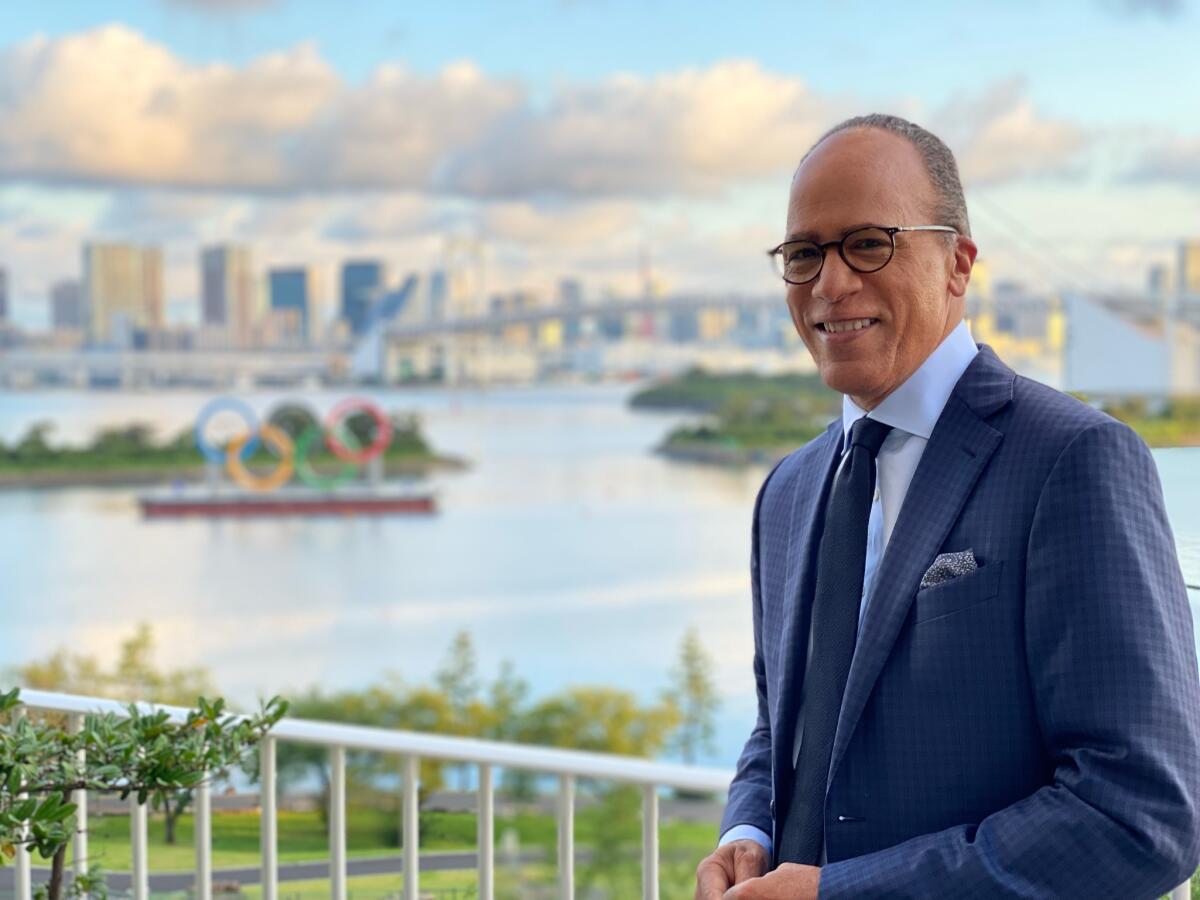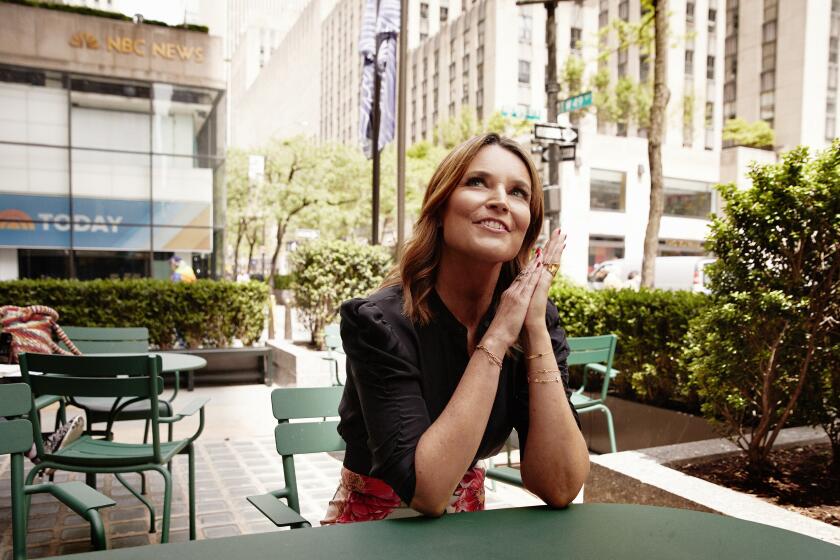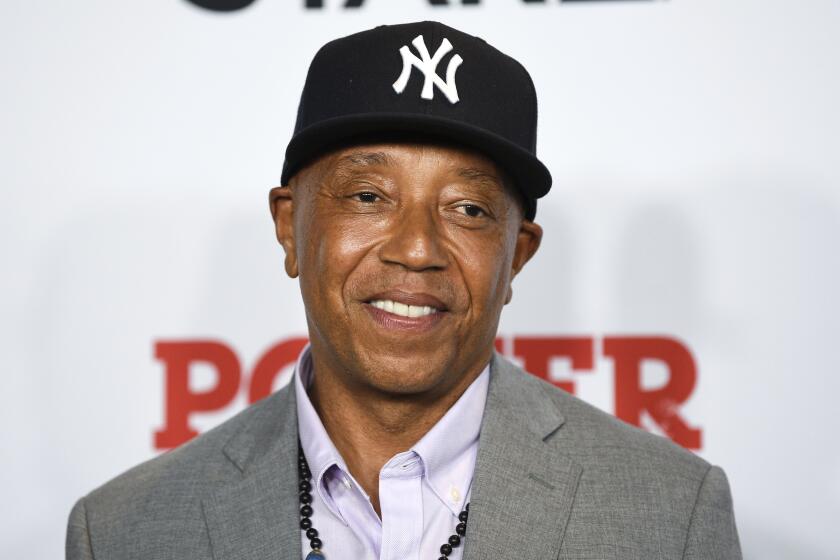For NBC News’ Lester Holt, Olympics’ challenges and wonders all part of the mix

- Share via
For years, when NBC has headed to the Olympic Games, “NBC Nightly News With Lester Holt” wasn’t far behind. But when the broadcast headed to Tokyo for the 2020 Summer Games that began Friday, it was almost like stepping back in time by a year.
The host city declared a state of emergency due to a rise in COVID-19 infections two weeks before the Games. Along with keeping spectators out of the stands, it’s limiting the ability of the news operation to immerse viewers in the locale. Holt, the program’s anchor since 2015, isn’t complaining. After covering 10 Olympic Games during his two-decade-plus tenure at NBC News, he knows the events in the world can often collide with the Games. He called from Japan to talk about the challenges of covering the current Games.
This interview has been edited for length and clarity.
The location you’re using for “NBC Nightly News” is spectacular. Where are you exactly?
We’re on an island. It’s called Odaiba, and it’s across the northern Tokyo Bay. And what you’re looking at behind us — they’ve got the Olympic rings on a barge tethered in the water. And then beyond that is the Rainbow Bridge, which connects the rest of Tokyo with this area.
How long did it take you to sort of get through the protocols there and get settled in for the broadcast?
For some people, it was taking nine hours to get through the airport; that was the worst case. We were out of there, from wheels down until we were in the car, in about three hours. There’s a lot of checkpoints, and we knew that there were going to be protocols. And we had been tested in the days prior to leaving New York. And then we land; we had to download these apps on our phones that allows [the Japanese government] to monitor our health condition, and frankly, where we are. Because we’re under some restrictions.
You’ve said you were in a “soft quarantine.” What does that mean?
Well, it means that I’m not stuck indoors for 14 days. They require us to stay at the hotel for 14 days. But within that as journalists we can go to venues. So the other day I had to go to the Olympic stadium. Our whereabouts are pre-notified — that I’m going to this venue and I’m doing this — but nothing that has really inhibited our ability to cover the Games. The restrictions really come to play when it comes to getting out and about on the streets.
So what can you tell me about the vaccination policy for you and the crew at NBC News? Was it a requirement for travel over there?
I don’t know if it was required. I was asked about my status, and I’m fully vaccinated. Just anecdotally, it feels like everybody I’m working with is vaccinated.
You did a piece pointing out how half of the Olympics that you’ve attended were clouded by a kind of doubt or potential crisis. Salt Lake City in 2002 coming after the 9/11 attacks. In 2004, Athens almost didn’t finish its preparations for the Games. There were terrorism fears in Sochi in 2014. The Zika virus in Rio in 2016. Does the current situation rank highest on the uncertainty scale?
A pandemic is a far more complicated situation in the fact that it brings the world together. We talk about a lot of these things, and at times it feels like it’s teetering on the edge. And certainly these weren’t made-up issues; these are very real challenges. But what I’ve noted over the years in doing these is that, once the starting guns go and once people are in the pool and the gymnasts are doing their thing, it kind of fades into the background to a certain extent as we’re captivated by these young athletes and the incredible things they do. Believe me, no one here is forgetting or discounting the pandemic. I had to take tests the first three days I was here, so we’re constantly reminded of the threat. But at the same time I had some downtime yesterday and I was sitting here just watching the Olympics.
Are you able to attend any events live?
Not yet. We’re actually having a discussion about that. It can take a day or so to get permissions to go. And then that has to do really with the amount of press observer seats that are available at a given venue, and nothing more than that. So we’re just trying to figure out our timing. But I would be extremely disappointed if I was not able to see an event or two while I’m here.
The coolheaded co-anchor survived a turbulent decade on NBC’s morning program, which is now adapting to the new TV landscape.
Do you have a favorite Olympic sport?
In the summer, I really love swimming because it’s one of those sports that when you see it in person you come to understand just how fast these people are propelling themselves through the water. You see it on TV, but in real life it’s like watching torpedoes aimed toward a submarine. I mean, it really is amazingly fast.
You’re talking to the athletes. How are they keeping their intensity without having the energy of the crowd? Do you sense that they have any sadness about it?
We’ve talked to a couple, and they miss obviously being able to look up in the stands and see a parent or someone they love. But I haven’t talked to anyone that has a sense of it’s taking them off their game. And in fact, one of the things we’ve witnessed is teammates who aren’t necessarily competing on that day are coming out to support. if you listen carefully you still hear some whooping and hollering along the way.
Is there debate in Tokyo about masks or vaccinations like we’re having here? What’s the biggest challenge over there?
I will tell you from my excursions out, mask-wearing seems to be universal here. I’m not sure if it’s completely mandated everywhere, but everywhere I’ve seen, people are mask-wearing. Anecdotally, I’ve talked to some of our people on the ground here who say there’s some grumbling and blaming of the government for the slow vaccine rollouts here.
So have you met Maria Taylor? (The sports journalist left ESPN after the NBA Finals and immediately joined NBC Sports for its coverage of the Games).
I have not. I was able to watch [her], but no, I have not met her.
How did they sort of tell everybody that she was coming?
They didn’t tell me. That’s probably at the NBC Sports level, so I wasn’t privy to that. Listen, I think she’s terrific. I’m glad she’s with us.
You recently had your sixth anniversary as anchor of “NBC Nightly News.”
Yes, somebody reminded me of it. I mean, I knew I was in the ballpark, but yeah. It’s hard to believe.
Has the job changed you in any way?
I think perhaps I’ve become a better leader. I was kind of shy about being in a leadership role. But it’s something I’ve become more comfortable with. I love collaboration. And I think for a lot of us, I think the pandemic has made it very difficult on that level. And that’s why I’m thrilled that eventually we’ll all be working under the same roof again; I’ll be able to really have those kind of conversations that are difficult to do, picking up the phone 50 times a day. But every day I count myself lucky; I don’t take any of it for granted.
More to Read
Inside the business of entertainment
The Wide Shot brings you news, analysis and insights on everything from streaming wars to production — and what it all means for the future.
You may occasionally receive promotional content from the Los Angeles Times.












